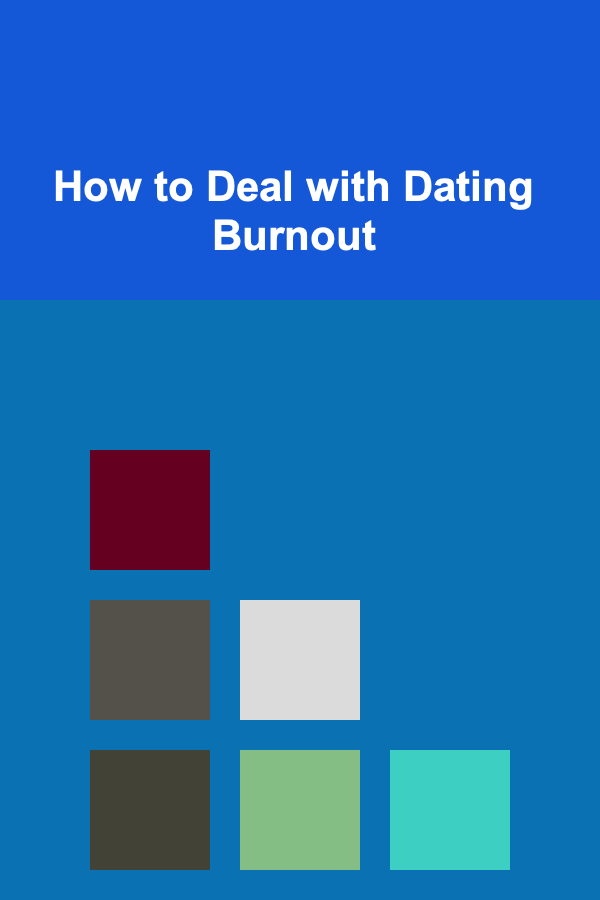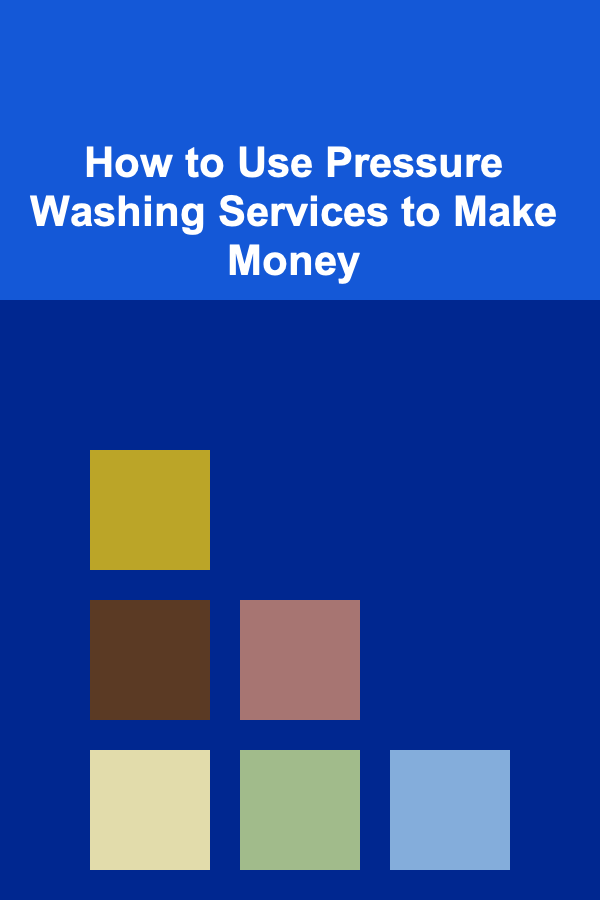
How to Deal with Dating Burnout
ebook include PDF & Audio bundle (Micro Guide)
$12.99$6.99
Limited Time Offer! Order within the next:

Dating is often portrayed as an exciting, romantic adventure where individuals meet new people, form connections, and potentially find a partner for life. However, in reality, the dating landscape can be much more complex, exhausting, and sometimes disheartening. Many people experience a phenomenon known as "dating burnout," where the process of dating becomes emotionally draining, overwhelming, and unfulfilling.
Whether you're using dating apps, engaging in casual meetups, or searching for a serious relationship, the cycle of failed dates, unreciprocated interest, and the pressure to find a match can take a toll on your mental health. Dating burnout is a real issue that many people face, but the good news is that it's possible to overcome it. In this article, we'll explore the causes of dating burnout and offer practical advice on how to deal with it effectively.
Understanding Dating Burnout
Dating burnout occurs when the emotional, mental, or physical strain from dating outweighs the potential benefits. It's common among individuals who put considerable effort into meeting people, whether through online dating, blind dates, or social gatherings, and continually face disappointment, frustration, or rejection. Over time, this can lead to feelings of exhaustion, detachment, and apathy toward the dating process.
The symptoms of dating burnout may vary, but some common signs include:
- Emotional fatigue: You feel drained or emotionally numb after a date, regardless of how it went.
- Apathy or frustration: You're no longer excited about the prospect of meeting someone new, and dates feel like a chore rather than an opportunity.
- Fear of rejection: The idea of being rejected or facing more disappointment becomes overwhelming, leading you to avoid new dates altogether.
- Reduced self-esteem: Constant rejection or negative experiences can affect your sense of self-worth and make you feel undeserving of love or affection.
Dating burnout can stem from various factors, including external pressure, unrealistic expectations, or unresolved emotional baggage. Understanding the root causes of burnout is the first step toward overcoming it.
Causes of Dating Burnout
2.1 The Pressure of Finding "The One"
In today's dating culture, especially with the proliferation of dating apps and online matchmaking, there is often a pervasive pressure to find "the one" --- a perfect match who fulfills all of your expectations and desires. This pressure to meet the ideal partner can become overwhelming and lead to burnout, as people place unrealistic expectations on their dates and themselves.
2.2 Overuse of Dating Apps
While dating apps can offer convenience and broaden your options, they can also lead to an overwhelming number of choices, leading to decision fatigue. With so many people to meet and endless profiles to browse, it's easy to feel lost in the sea of options and overwhelmed by the process of swiping, messaging, and scheduling dates. The constant influx of new people to evaluate can quickly lead to emotional exhaustion and disconnection from genuine connections.
2.3 The Fear of Rejection
Rejection is a common part of dating, but when faced repeatedly, it can take a significant emotional toll. The fear of rejection can discourage individuals from trying again, even when the previous experience wasn't entirely negative. This fear may also make people approach dating with skepticism, viewing every new interaction as a potential failure, which further fuels burnout.
2.4 Unrealistic Expectations and Comparisons
In the era of social media and curated profiles, it's easy to fall into the trap of comparing your dating life to others. Watching friends or acquaintances enter relationships while struggling with your own experiences can create a sense of inadequacy. Moreover, the idealized version of romance seen on television or social media can lead you to develop unrealistic expectations for your own relationships, setting you up for disappointment.
2.5 Emotional Baggage
Past relationships and unresolved emotional issues can contribute to dating burnout. If you're entering the dating scene with emotional baggage---whether it's from a past heartbreak, a toxic relationship, or unhealed wounds---it can make it difficult to approach new connections with an open heart. This can create a cycle of emotional exhaustion and burnout, where you feel drained by the effort to connect with others while still carrying unresolved issues from the past.
2.6 The Cycle of Casual Dating
Casual dating, though fun in theory, can lead to burnout if it lacks clear intentions. When dates are not leading to meaningful relationships or genuine connections, individuals may begin to feel disillusioned and frustrated. The fleeting nature of casual relationships may feel like a constant cycle of emotional investment followed by disappointment, which can ultimately lead to burnout.
Signs You Might Be Experiencing Dating Burnout
Recognizing the signs of dating burnout is an essential step in dealing with it. If you're experiencing any of the following, you may be suffering from burnout:
- Loss of interest: You no longer find joy or excitement in dating and may feel indifferent about meeting new people.
- Negative outlook on dating: You start to see dating as a pointless or frustrating task rather than a fun and enriching experience.
- Emotional distance: You're starting to build emotional walls, finding it difficult to connect with potential partners.
- Avoidance: You begin to avoid dating altogether or cancel dates at the last minute because you're not interested.
- Physical and mental fatigue: The mental and emotional exhaustion of dating affects your overall well-being, leading to feelings of stress or anxiety.
If you identify with these symptoms, it's important to take steps to address the burnout before it negatively affects your emotional health.
How to Deal with Dating Burnout
Overcoming dating burnout involves both internal and external work. It's about setting healthier boundaries, managing expectations, and reconnecting with the purpose of dating. Below are several strategies to help you manage and overcome dating burnout.
4.1 Take a Break
Sometimes, the best way to deal with dating burnout is to take a step back. Allow yourself to take a break from dating, whether it's for a few weeks or months. Use this time to focus on self-care, emotional healing, and personal growth. A break can provide the space to reset your mindset and prevent further emotional exhaustion.
- Focus on hobbies and passions: Spend time doing things you love that bring you joy and fulfillment, whether it's reading, traveling, exercising, or learning a new skill.
- Cultivate other relationships: Strengthen bonds with friends, family, and other social connections. Often, the pressure to find a romantic partner can overshadow the importance of platonic relationships, which are equally valuable.
A break from the dating scene will help you regain perspective and recharge emotionally so that you can approach dating with a fresh outlook.
4.2 Shift Your Mindset
A significant contributor to dating burnout is the pressure to meet someone and find a relationship quickly. By shifting your mindset, you can take the pressure off and approach dating with a more relaxed and open attitude. Consider the following approaches:
- Embrace the journey, not just the destination: Instead of focusing solely on the end goal of finding a partner, try to enjoy the process of meeting new people and getting to know different personalities.
- View dating as an opportunity to learn: Every date, whether successful or not, can teach you something valuable about yourself, your preferences, and what you want in a relationship. Embrace each experience as a learning opportunity rather than a potential failure.
- Be patient with yourself: Understand that finding the right partner may take time. Avoid rushing into relationships or settling for a match that doesn't feel right just to avoid being single.
A mindset shift can alleviate the pressure you may feel and create a healthier approach to dating.
4.3 Manage Expectations
One of the main drivers of dating burnout is unrealistic expectations. Whether it's expecting perfection from a partner or hoping for an immediate connection, high expectations can lead to frustration and disappointment. To avoid this, manage your expectations:
- Be realistic about what you're looking for: Understand that no one is perfect, and every potential partner will come with their own strengths and flaws.
- Don't expect instant chemistry: Relationships take time to develop. Don't expect to find the perfect person on your first date, or even your tenth. Allow for connections to grow naturally.
- Accept that rejection is part of the process: Rejection is inevitable, but it's not a reflection of your worth. Learn to view rejection as a natural part of dating, not a personal failure.
Managing expectations helps reduce frustration and makes the dating process more enjoyable and less stressful.
4.4 Focus on Self-Care
Dating, especially when done consistently, can be emotionally draining. Taking care of your mental and emotional health is essential during this time. Here are some self-care practices to incorporate into your routine:
- Practice mindfulness and relaxation: Engage in activities like meditation, yoga, or journaling to help manage stress and regain emotional balance.
- Exercise regularly: Physical activity not only improves your overall health but also helps boost your mood and energy levels.
- Sleep well and eat healthy: Good nutrition and enough rest are critical for maintaining mental clarity and emotional stability.
- Seek professional help if needed: If dating burnout is affecting your mental health significantly, consider speaking with a therapist or counselor to work through underlying issues.
Self-care is essential for rebuilding your emotional resilience and ensuring that you approach dating in a balanced and healthy way.
4.5 Set Healthy Boundaries
To prevent burnout, it's crucial to set healthy boundaries when it comes to dating. This involves knowing when to say no, recognizing your emotional limits, and being mindful of your time and energy. Consider these tips:
- Don't over-schedule dates: Avoid filling your calendar with back-to-back dates. Give yourself space between meetings to recharge.
- Be clear about your intentions: If you're not interested in pursuing a relationship with someone, be honest and respectful in your communication. Setting clear expectations prevents emotional misalignment.
- Know when to walk away: If you feel that a date or potential relationship is causing more stress than it's worth, it's okay to walk away. Trust your instincts and prioritize your emotional well-being.
Setting boundaries allows you to approach dating on your own terms and reduces the emotional strain of feeling obligated to pursue every opportunity.
4.6 Reconnect with Your Core Values
Ultimately, dating should be an enjoyable and fulfilling experience that aligns with your personal values. Reconnect with why you're dating in the first place, and make sure that your actions align with your core beliefs.
- Know what you want: Be clear about your goals in dating. Whether you're looking for a casual relationship, a committed partnership, or simply trying to meet new people, understanding your desires will help you focus your energy in the right direction.
- Find purpose in dating: Dating is not just about meeting someone for the sake of it. It should contribute to your personal growth and bring joy into your life. If it no longer does, it may be time to reevaluate your approach.
By reconnecting with your core values, you can ensure that dating remains an enriching experience rather than a draining one.
Conclusion
Dating burnout is a real and challenging experience, but it is also temporary. By taking the right steps---whether it's taking a break, adjusting your mindset, managing expectations, practicing self-care, or setting boundaries---you can overcome burnout and rediscover the joy of connecting with others. Remember that dating is not a race; it's a journey that should be approached with patience, self-awareness, and a healthy outlook. By caring for your emotional and mental well-being, you can create a dating experience that feels fulfilling rather than exhausting, leading you toward the meaningful connection you seek.

How to Incorporate Natural Elements in Your Holiday Decorations
Read More
How to Make Your Home Less Vulnerable to Cyber Hackers
Read More
How to Sell Digital Products Successfully for Consultants
Read More
How to Use Pressure Washing Services to Make Money
Read MoreProtecting Your Browse History from Tracking: A Comprehensive Guide
Read More
How to Cook Perfect Rice Every Time
Read MoreOther Products

How to Incorporate Natural Elements in Your Holiday Decorations
Read More
How to Make Your Home Less Vulnerable to Cyber Hackers
Read More
How to Sell Digital Products Successfully for Consultants
Read More
How to Use Pressure Washing Services to Make Money
Read MoreProtecting Your Browse History from Tracking: A Comprehensive Guide
Read More